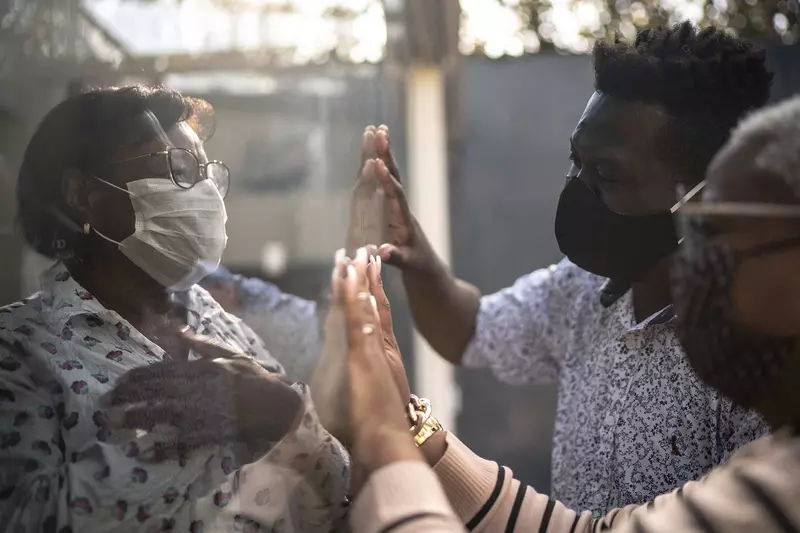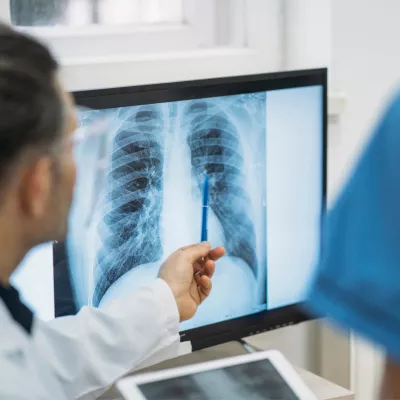- AdventHealth

Many people around the world are anxiously awaiting a COVID-19 vaccine, with distribution already underway for health care personnel and older adults — a process that ordinarily could take years, achieved in a matter of months. But not everyone feels that they are personally ready to receive the vaccine.
The quick development of the vaccines understandably raises questions about how a vaccine could be developed so quickly. And for some people, particularly members of the Black community, the skepticism is about more than the quick process.
Alric V. Simmonds Jr., MD, AdventHealth General Surgeon, Chief Health Equity Officer and Chief Medical Officer explains that “People of color in this country have received intentional malady from government officials, and the community remembers that.”
Dr. Simmonds adds, “There are atrocities that have been committed against people, that are historic in nature, but are readily available to the memory, especially during a pandemic when you think about a treatment being something that one must take into their own body. That distrust and hesitance is very real.”
“We understand, and we want to help people get to where they need to be to prevent this disease,” he explains.
Vaccine Development and Regaining Trust
One reason the vaccine was developed so quickly was the use of messenger ribonucleic acid, or mRNA. “Technology has advanced, and this messenger RNA vaccination is one of those advances. The mRNA technology has allowed the companies who manufactured the vaccine to move at a much quicker pace in their development,” says Dr. Simmonds.
Several COVID-19 vaccines are being made using synthetic mRNA, which drives protein production in cells to help defend the body against the virus. “Once the science behind the COVID-19 vaccination is understood, there shouldn’t be hesitancy or fear,” explains Dr. Simmonds.
Dr. Simmonds and AdventHealth, however, understand that this hesitancy and fear is deep-rooted for the Black community.
Justified Skepticism in the Black Community
Many Black Americans believe that people are treated unfairly based on their race or ethnicity when they seek medical care. When considering women who are more likely to die from pregnancy-related causes, for example, the deaths per 100,000 live births for Black, American Indian and Alaska Native women older than 30 was four to five times as high as it was for white women, according to the Centers for Disease Control and Prevention (CDC).
For Black Americans, a long history of racist mistreatment has also led to distrust when it comes to medical care, such as the Tuskegee experiments from 1932 to 1972 where Black patients were unknowingly used for syphilis research purposes and then never given treatment to cure their illness.
“The term ‘justified skepticism’ sums it up perfectly. We understand this is where many begin their journey, and we want to explain that it’s OK that this vaccine developed rapidly,” says Dr. Simmonds.
What Is mRNA, and How Is It Used in Coronavirus Vaccines?
Some vaccine production methods for COVID-19 have been using mRNA to trigger the body’s immune system to produce protective antibodies without using the actual virus.
While vaccines for some other illnesses — such as the varicella (chickenpox) vaccine — actually use bits of the virus in the vaccine to create what’s called a “live virus vaccine,” the COVID-19 vaccines being produced do not contain any virus material, live or inactivated.
Instead, some coronavirus vaccines essentially work by using synthetic mRNA to direct the body to produce a small amount of the spike protein. Once the vaccinated person’s immune system detects this protein, their body begins producing protective antibodies to defend against coronavirus.
Experts say that the protective antibodies will recognize and prevent COVID-19 from getting into the body’s cells in the future, should that person be exposed to coronavirus.
“I am the chair of our scientific review committee for COVID-19,” says Dr. Simmonds. “We’ve had ample opportunity to really look at the scientific data — to look at the efficacy and the risk-benefit profile of this vaccination,” he explains, adding, “Quite honestly, I did have some initial hesitancy (about the COVID-19 vaccine), but I am a scientist, and I believe in the science.”
What to Know About mRNA
This is the first time a synthetic mRNA vaccine is being widely distributed. The technology allows mRNA vaccines to be developed faster than traditional methods of vaccine development.
“Vaccinations help populations of people survive grave illnesses,” Dr. Simmonds explains. “If you’ve gone to school or if you’ve played team sports, you’ve been vaccinated for measles, mumps, chickenpox and other illnesses. Our bodies tolerate these things very well and they keep us safe.”
mRNA Isn’t a New Science
A Hungarian scientist named Katalin Karikó dedicated her time from the 1990s to today working toward mRNA use to fight diseases. In the 1990s, she was unable to gain a lot of support or funding because her ideas were so new and, some thought, hard to believe.
But, as the years have gone by, she and other scientists made more breakthroughs in research and experimenting, later being discovered by the (now) founders of BioNTech, the German partner of U.S. pharmaceutical companies Moderna and Pfizer.
mRNA Vaccines Are Here, and They Shouldn’t Be Feared
With mRNA, what may look like a “new” advancement is actually science that’s been in the works for decades. Karikó is now the senior vice president at BioNTech, overseeing the mRNA work and research she started years ago, while major pharmaceutical companies have launched the first mRNA vaccines for widespread use.
For many people across the world who are waiting for life to get back to “normal,” this progress is a shining light at the end of the tunnel.
“We need people to get this vaccine so that the community can return to some sense of normalcy and achieve that herd immunity we’ve been talking about,” says Dr. Simmonds, adding, “I understand why some people aren’t sure, but please don’t let your fear prevent you from taking a vaccination that will save you. If you do, you may end up like many of the patients who are in my ICU now, people whose families cannot be with them when they’re taking their last breath.”
He urges, “Over 300,000 Americans, largely people who are brown and Latinx, have died of this disease. So, make the right choice. Roll up your sleeve and get the shot.”
Get Vaccinated When Possible
We’re here for you every step of the way as new COVID-19 developments arise. Visit the Coronavirus Resource Hub for more news and updates from your trusted team of medical experts. We are following the current administration of vaccines based on CDC and state government guidelines. For more information about when the vaccine will be available for you, we encourage you to sign up for email alerts at www.CoronavirusVaccineAlerts.com.


